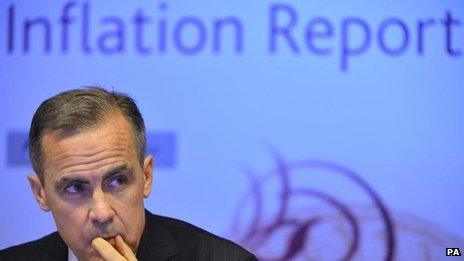Is the UK's recovery too robust?
- Published
- comments

Will Mark Carney have to raise rates to head off inflation?
With living standards still squeezed and the value of what we produce in Britain not yet back to where it was in early 2008, most would say that any recovery will do.
Surely, therefore, it's great news that the Bank of England has described the UK economy as growing robustly.
Such has been the mind-befuddling density of the gloom that enveloped us after the Crash, it is quite difficult to remember when the Bank of England sounded so positive.
If nothing more (and there has been more), the arrival of Mark Carney at the Bank of England has sparked a cultural revolution: today's Inflation Report from the Bank read less like the traditional plan to fend off any incipient inflationary threat and more like a manifesto for economic expansion.
But, at the risk of sounding like a curmudgeon, is there a danger that the growth - at 3% or so for the next three years - is too robust?
Because growth that prompted a sharp rise in inflation would (surely) force the Bank of England to raise interest rates sharply.
And that would be a miserable prospect for millions of people with big mortgages and other debts.
To remind you, since the Crash, the indebtedness of British people has come down as a percentage of income, from a record 163% in 2007-08 to 140%.
But that is still high by historical standards - and the absolute value of those debts is a record, at more than £1.5 trillion.
What's more, the debts are not distributed evenly; there are millions with disproportionately larger debts.
So if interest rates rose by only two or three percentage points, too many would struggle to maintain their payments.
How great is the risk of an inflation-induced, economy-crippling rise in interest rates over the next couple of years?
The Bank of England calculates the risk as low: its conviction is that there is plenty of slack in the economy, and that therefore there won't be a self-reinforcing cycle of rising prices and wages as we all buy more or invest more.
But this assumes the productivity or efficiency of workers will improve significantly, that the extra demand for stuff (goods and services) can be met by all of us producing more for the same money.
Which may turn out to be what happens.
But the Bank's confidence in this assumption - to coin its own phrase - does not seem especially robust (a new era, Carney-esque leap of faith, perhaps).